The real-life Q is quite different to the one you see on the big screen. He seems less absent-minded and eccentric, for a start. And, as far as we can tell, his pens don’t contain any explosive devices. Yet Simon Lane, in his role as head of Aston Martin’s Q bespoke division, is in charge of developing cars as creative, bold and deceiving as anything MI6’s Quartermaster might produce.
Having long offered a customisation service through the Works Tailored arm run from its Newport Pagnell plant, Aston launched the expanded Q division at its Gaydon base in 2012 with a licence to produce highly modified and bespoke models as demanded by its most loyal customers.
Most premium car makers have similar operations, but what Lane believes sets Q apart is a more fun approach, as its name hints. “I like to think we push the boundaries more than our competitors in terms of what’s possible,” he says. “And that goes right up to building bespoke one-off cars.”
Q has three main offerings. Q Collection offers special parts and options for standard Aston models. Q Commission gives customers more freedom in terms of customising their cars, with a focus on colour and trim. The pinnacle, and you suspect the service that James Bond would head straight for, is Q Advanced Operations.
Lane says this is for customers “who don’t want anything on the menu and want to do something completely different”. That can range from non-standard powertrains and bodywork to fully customised cars.
To demonstrate what Q is capable of, we staged a top-secret mission to bring together five of its finest creations and asked Lane to showcase their highlights.
Vantage V600
A tribute to the 1999 Aston Vantage V600 (one of world’s most powerful production cars at the time), this 2018 special edition based on the previous-generation Vantage was the result of a commission from a single customer.
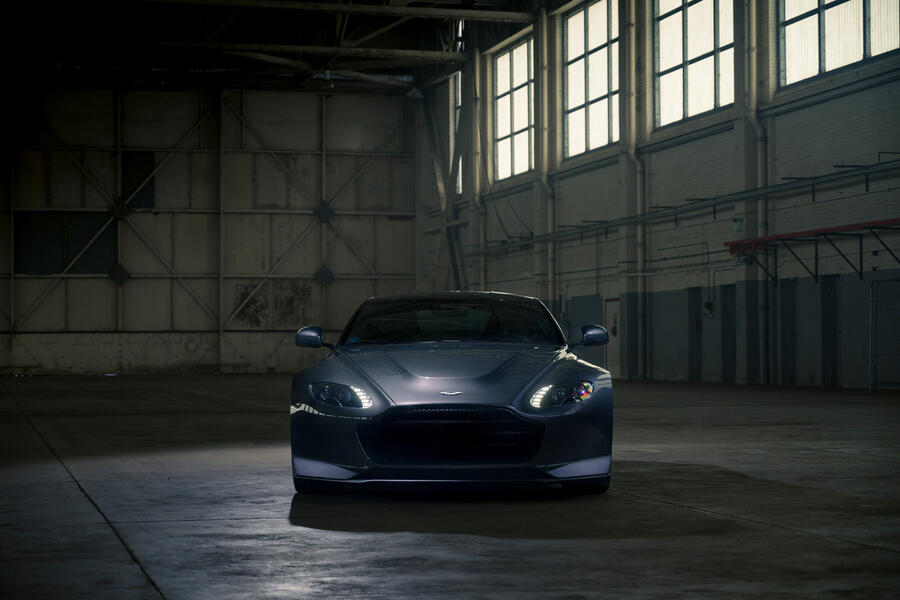
“He wanted a machine based on the V600,” says Lane. “We have to put every part on a bespoke car through the same testing we would any part on a series-production model, which can be expensive. He said he would underwrite the development and help find other buyers, which means we could split the development, testing and engineering costs across seven coupés and seven convertibles.”
The result was also a run-out special, with the 14 examples the final cars to use the VH platform – which also made them the final Vantages to have a naturally aspirated V12. And the body was extensively reworked in the style of the 1999 V600, which Lane describes as “a bruiser”.
Lane says: “The customer wanted a bespoke exterior using carbonfibre; the only surviving panels are the doors and roof. There are clear design links and some really nice details. We kept the original side sill shape, so it has a real Coke-bottle shape, and the bonnet bulge is a very clear nod to the original V600.”
So is the darkened grille, while the heavily reworked interior features a carbonfibre centre console and lightweight seats.
Lane admits that the V600 was “an expensive exercise because we had to do a lot of the testing we originally did on the car again”. He adds: “It would be very difficult to do that for a single bespoke car, but doing it on a run of cars meant we could do it for the customer at a sensible price point and find some other customers as well.”
Vantage 007 Edition
One of two special cars developed as a tie-in with the much-delayed No Time to Die, the Vantage 007 Edition is a homage to the Vantage V8 that appears in the film, having first been seen in 1987’s The Living Daylights.
While based on the Vantage, the 007 Edition is packed with subtle details that reference the original car, starting with the matching Cumberland Grey paint. The most notable detail is the new mesh grille, which required a lot of engineering.
“It’s a direct nod to the original, with the same laser-cut square grille effect,” says Lane. “Just that part alone required substantial engineering, because the airflow that goes through the Vantage grille is close to the limits of what’s needed, and we had to calculate it all in litres per second to make sure there was enough air reaching the engine.”
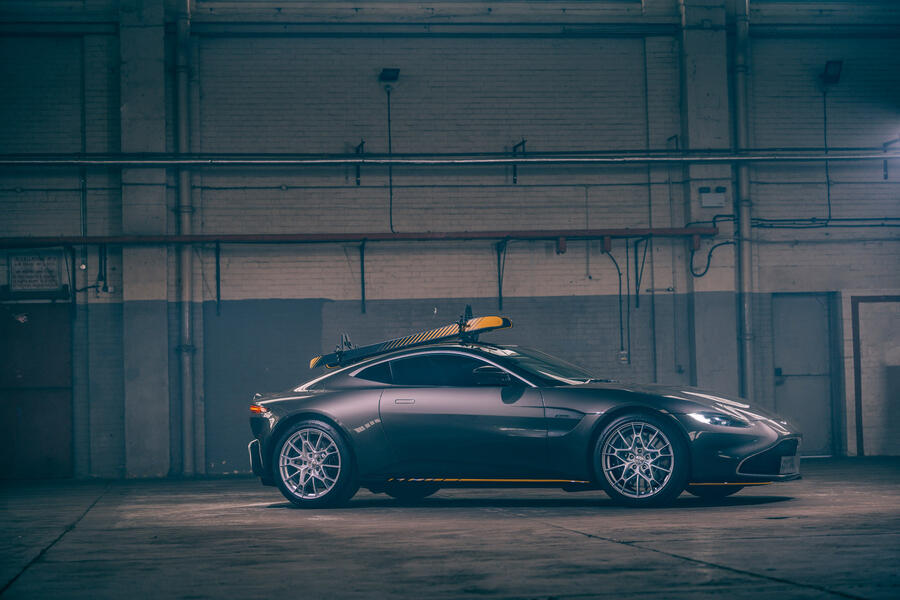
Hazard stripes on the diffuser echo the rockets on the film car, while inside there’s 007 branding on the centre console, including a gadget switch panel that matches the original (but sadly doesn’t work). The seats gain trim that references the original Vantage V8 and there are carbonfibre rear seats as well.
The Living Daylights car features retractable skis for use in wintry conditions, and one optional feature of the new model pays tribute to them. “The budget wouldn’t stretch to deployable skis, but we brought them to the car by offering a sucker ski rack package that can affix to the back of the car with some custom skis that feature the same black-and-yellow design,” says Lane. That might sound like a gimmick, but the ski rack has proven a hit: about two-thirds of the customers so far have ticked that option box.
DBS Superleggera Concorde Edition
All three of Aston Martin’s factories were built on former Royal Air Force bases, and Q has paid tribute to that link with its Wings series of aviation-themed cars. The latest is the DBS Superleggera Concorde Edition, which has just gone into production; the example at our photoshoot was the first off the line.
The special edition pays tribute to the supersonic passenger jet with numerous design features packed with nods and neat touches. “This project was a privilege to be part of,” says Lane, reflecting the hours of research that went into loading the 10 examples with references to the plane. “We went to the Concorde museum at Filton in Bristol and to the British Airways Heritage Centre, which gave us loads of ideas.”
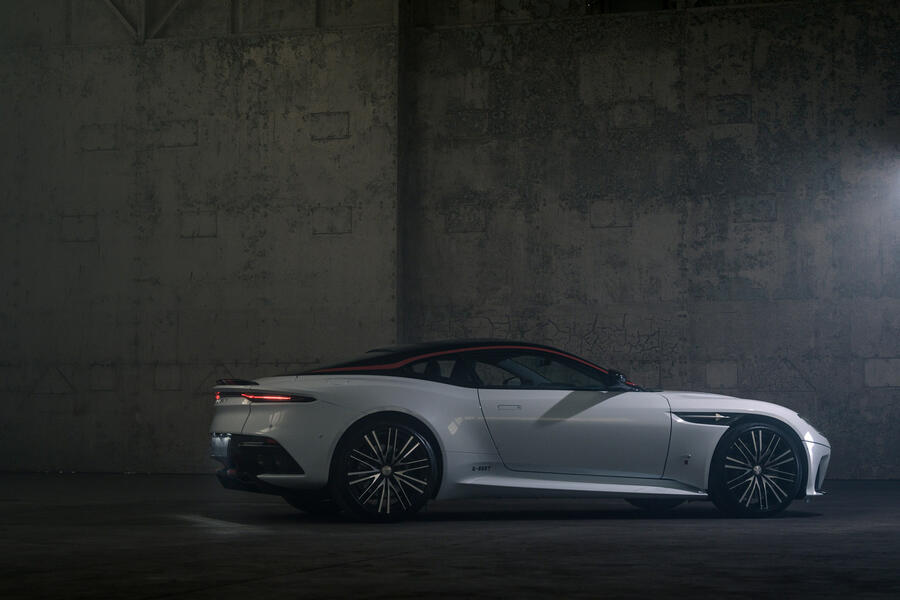
Twenty Concordes were built, split evenly between the British Aircraft Corporation in Filton and Sud Aviation in Toulouse, France.
The 10 examples of the DBS Superleggera Concorde Edition were all sold via Aston Martin’s Bristol dealership, located within sight of the former Concorde factory. With the permission of Airbus and British Airways, each of the 10 cars carries the registration code of one of the Filton-built Concordes. And there are plenty of other details.
“The shift paddles are made from aluminium supplied to us by BA, which was taken from the Concorde that still resides at Heathrow,” says Lane. “We melted it down and reforged it as paddles, so you actually touch a bit of Concorde when changing gear.
“The carpets were made by Axminster Carpets, using a roll stock of unused Concorde carpet they had. It’s special, because the carpet had to be engineered to stretch about a foot in flight: Concorde became so hot that the airframe would stretch, so the carpet had to match.”
There’s more: the car is offered with a luggage set modelled on one offered to customers on the final Concorde flight and the paint scheme features BA colours. Inside, there’s a machmeter graphic built into the sunvisor and a ‘sonic boom’ graphic headliner.
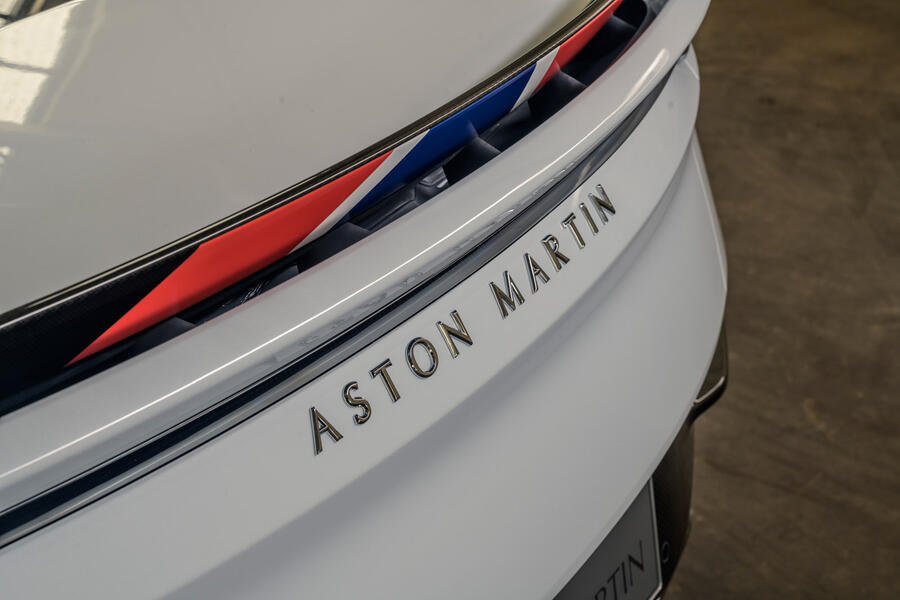
Perhaps the most stunning detail, though, is the unique aluminium side strake, modelled in the shape of the Concorde. “That piece is beautiful,” says Lane. “It was milled from an aluminium billet and then hand-polished. It’s a standout feature, showing the sort of artisan work that we love doing.”
As part of the project, Aston Martin made a donation from the sale of each Concorde Edition to the Air League Trust, which helps to teach underprivileged children how to fly and break into engineering jobs.
V12 Speedster
The roofless and windscreenless V12 Speedster is the most extreme car yet produced by Q. It mixes the underpinnings of the Vantage Roadster and the DBS Superleggera, and is fitted with Aston’s 690bhp twin-turbocharged V12 engine. Lane calls it “essentially a stand-alone car”.
“We’re making five prototypes, with two used for crash-testing,” he says. “We’re building only 88 cars, which will take a year, because the process is very different from our usual cars: they’re largely bay-built, rather than going down a line.”
Lane says, as a visceral two-seater, the £765,000 V12 Speedster is inspired by fighter jets and will be offered in a range of specifications. There’s a McDonnell Douglas F/A-18 Hornet version and an Aston Martin DBR1-inspired trim alongside a number of other special designs – although, in traditional Q fashion, these are currently classified as For Your Eyes Only.
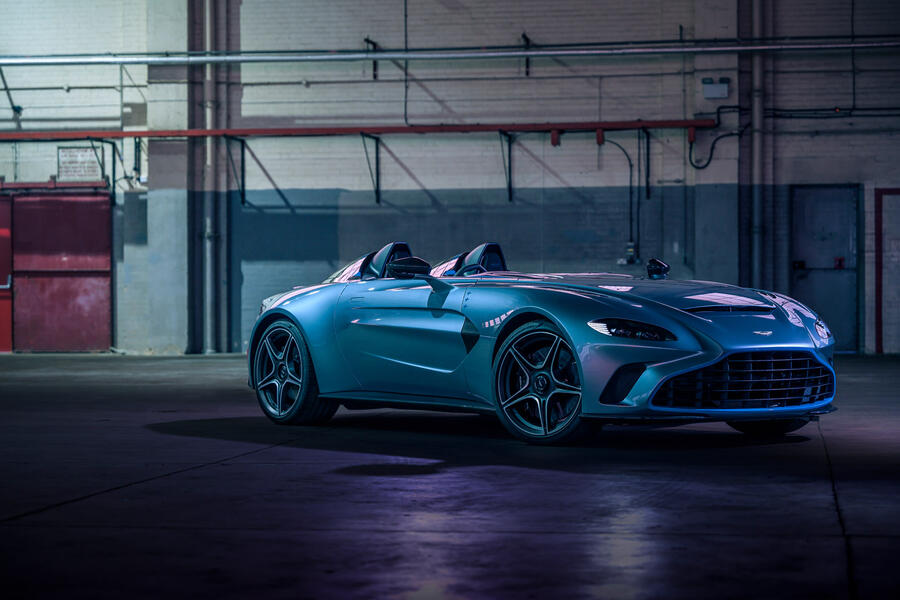
“We’ve really gone to town on some of the special design options,” says Lane. “The V12 Speedster is an amazing car in its own right, with lots of nods in the design to old Aston models and fighter jets, but the specials have allowed us to really let loose our imagination.”
The V12 Speedster shown at launch, for example, was inspired by the F/A-18 and featured contrasting black exhaust tips and vent grilles, special red door pulls and an interior that makes extensive use of dark chrome and machined aluminium.
“The packs were a lot of fun to do,” says Lane, “but equally our customers are very creative. We gave the 88 buyers various options and have had good take-up on the trim packs, but some customers have their own ideas of what they want to do on their cars. We’re expecting all sorts of different liveries to emerge.”
DB5 Goldfinger
This is the project in which Aston Martin’s Q division has gone all out to match MI6’s Q Division. The 25 DB5 Goldfinger models – each priced at £3.3 million but not road-legal – are exact replicas of James Bond’s most famous car, fitted with ‘working’ versions of almost all the gadgets seen in the Goldfinger film.
The project combines the skills of Q, the Aston Martin Works heritage arm in Newport Pagnell and Bond film special-effects supervisor Chris Corbould.
“The Works team are used to restoring DB5s,” says Lane, “and while building one from scratch isn’t something they do every day, they’ve done some pretty epic restorations. Part of the challenge is that no two DB5s were built exactly the same, so although they sourced a number of cars and created a set of blueprints to re-engineer to a modern standard, getting that finalised was a major challenge.”
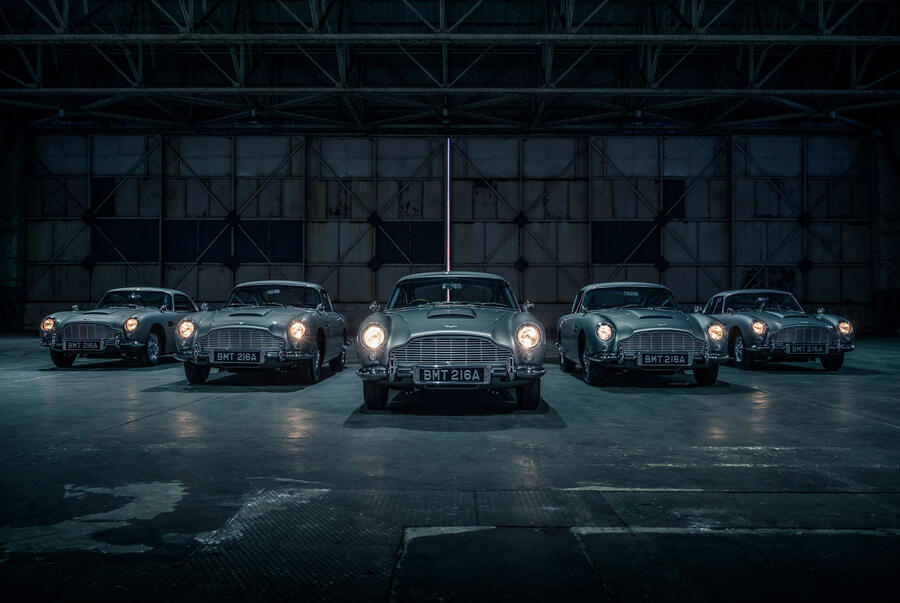
Then came the gadgets, which Lane says were “a lot of fun”, despite being the project’s biggest challenge. He adds: “Just engineering those was an amazing journey for the team. Frankly, we had to make them a lot safer and more reliable than on the original film cars and ensure they could be used time after time.” That meant finding ways to install gadgets such as a rotating numberplate, machine guns (mock ones, of course), a bulletproof rear deflector, battering rams, an oil-sprayer and a smokescreen system without adjusting the DB5’s shape – and they couldn’t just copy the cars used for the original film.
“The machine guns were operated by a small acetylene bottle, with a spark plug to recreate the machine gun flash,” says Lane. “We couldn’t do that on a modern car so had to create a new – and more robust – system that has a more realistic recoil and muzzle flash, and we added an MP3 player to recreate the machine gun noise.
“The team really took making the gadgets to heart. For example, we took one of the bulletproof deflectors and fired bullets at it to make sure it really was bulletproof.”
Not every gadget could be recreated in full: the pop-out tyre-shredders are actually stored in the boot and can be attached. And, predictably, there isn’t actually an ejector seat – although a panel above the passenger can be removed for effect.
Lane’s favourite gadget, though, is inside the car: the navigation screen. “We managed to recreate the sliding cover for it,” he says, “and the screen looks and makes the same radar noise as in Goldfinger, but it’s a working sat-nav. It’s the gadget you show people that surprises them the most.
“But the coolest thing is the remote control we built to go with it to make it really fun for customers. It looks just like the control panel in the car, with period switchgear and a big red ‘fire’ button. It’s a party piece, and I’m sure collectors will take lots of pleasure from it.”
Which Aston Martin customers Q?
The Q Commission service is offered across the full Aston Martin model range, and boss Simon Lane says the uptake of it increases the higher you go up it. “With special cars such as the Vanquish Zagato series, about 60% go through Q for bespoke colour and trim work,” he reveals.
The only limit is the cost, which is often set more by testing than materials. “We were asked recently about putting a full Alcantara interior into a car we don’t offer Alcantara for,” says Lane. “We’ve tested the upper part of the instrument panel for airbag deployment with leather but never with Alcantara, so we’d have to do that to put it into production. So that cost has to be borne by that customer or we need to find other customers who want the same thing to amortise the cost.”
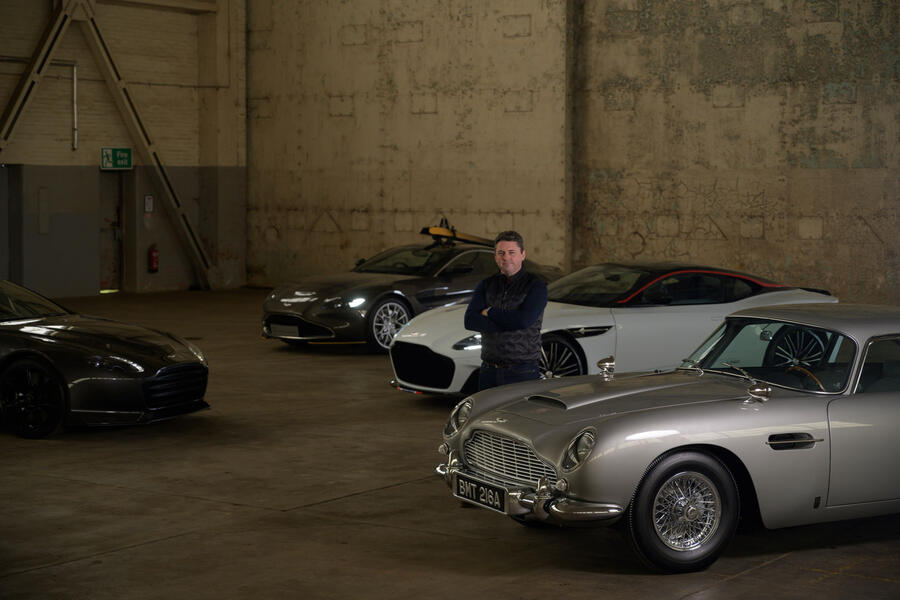
The Q Commission service is being used heavily for the forthcoming Aston Valkyrie hypercar. “We’ve now completed specifications for almost all 150 road cars, and they’re all different,” says Lane. “We’ve got a room dedicated to doing those specifications at Gaydon. Customers work with a colour-and-trim expert and a CAD artist, who can bring the design to the screen in front of their eyes. There won’t be any Valkyrie that looks the same as another.”
While Lane is coy about what kinds of specs Valkyrie customers have chosen, he does give one example: “One customer sourced some moon rock and wanted us to crush it and mix it into the paintwork of his car.”
V8 Cygnet
A late withdrawal from our shoot, the V8 Cygnet was Q’s take on one of Aston Martin’s baffling rebadged Toyota iQs. That said, by the time Q had crammed the 430bhp 4.7-litre V8 and much of the running gear from a Vantage S into the city car shell, not that much of the original remained.
“It was an idea that had been floating around in Q Advanced Operations for a while, that it would be funny to put a V8 engine in a Cygnet,” says Lane. “One of our very good customers, who already owns a Vulcan and a One-77, among various other cars, said he wanted us to do it. He knew the engineers well from our track-day events and knew how badly the engineers wanted to do it.”
“We built it as a true one-off car, and it caused a lot of amusement – but at the same time, it’s a great, fun car to drive: putting a V8 engine in a car with that short a wheelbase meant it was always going to be.”
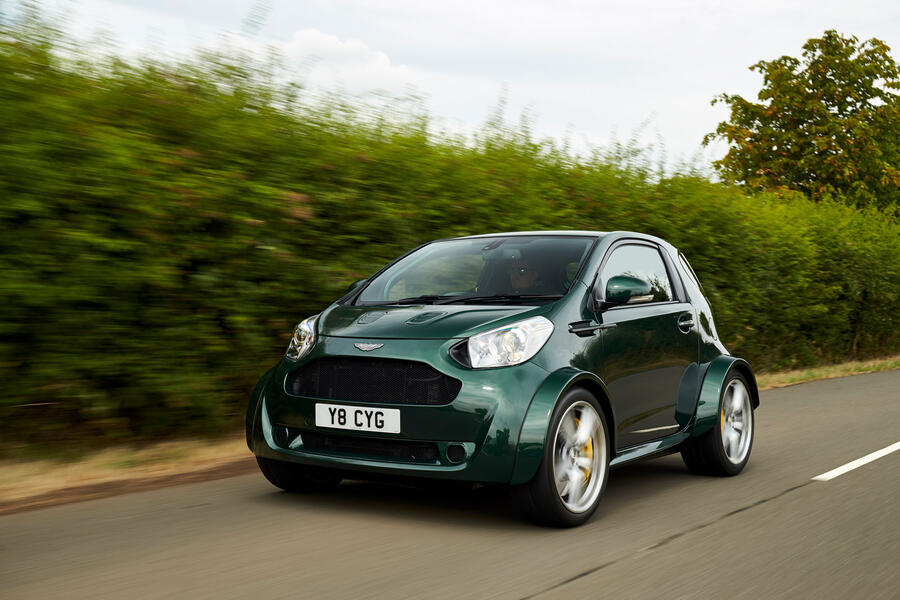
Lane admits that fitting the V8 into the tiny car was “not easy” and involved installing a full roll-cage that became an integral part of the chassis, along with a new front bulkhead and transmission tunnel.
“There’s a lot of V8 Vantage in that car,” says Lane. “It’s a Cygnet bodyshell, but it has a shortened bespoke Aston Martin propshaft and a Vantage S gearbox, and it’s built as much from our own parts as the Cygnet original. It has been heavily modified inside as well.
“It’s not something we would ever put into production, but it’s a great demonstrator about what it’s possible for Q to do. If somebody wants to imagine something and we think it’s possible, we’ll try to deliver it.”
READ MORE
Aston Martin DBX gains bespoke Q options for Geneva
One-off Aston Martin Victor is road-legal V12 hypercar
Aston Martin 007 Edition models celebrate new James Bond film
Used cars for sale
https://news.google.com/__i/rss/rd/articles/CBMiYmh0dHBzOi8vd3d3LmF1dG9jYXIuY28udWsvY2FyLW5ld3MvZmVhdHVyZXMvcmVhbC1saWZlLXEtYnJhbmNoLWNhcnMtYXN0b24tbWFydGlucy1iZXNwb2tlLWRpdmlzaW9u0gEA?oc=5
2021-02-14 06:10:20Z
CBMiYmh0dHBzOi8vd3d3LmF1dG9jYXIuY28udWsvY2FyLW5ld3MvZmVhdHVyZXMvcmVhbC1saWZlLXEtYnJhbmNoLWNhcnMtYXN0b24tbWFydGlucy1iZXNwb2tlLWRpdmlzaW9u0gEA
Tidak ada komentar:
Posting Komentar